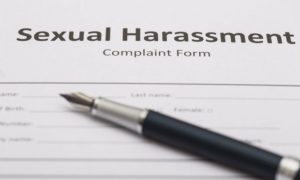California Law Update: What Employers Need to Know About New Sexual Harassment Laws
By Katherine Catlos, Esq. and Brandon Kahoush, Esq.
On September 30, 2018, Governor Jerry Brown signed multiple anti-harassment bills into law, which includes Senate Bill No. 1300 (“SB 1300”), outlining the legislature’s intent to ease the plaintiff’s burden in sexual harassment lawsuits and explicitly stating the legislature’s intent that sexual harassment cases are rarely appropriate for disposition by summary judgment. Stated differently, it is now much easier for employees to successfully sue their employers for sexual harassment. In addition, Governor Brown vetoed Assembly Bill 3080 (“AB 3080”), cutting down the California legislature’s attempt to criminalize mandatory arbitration agreements within employment agreements.
Key Takeaways from SB 1300
SB 1300 expands liability for employers by making them responsible for acts of nonemployees with respect to any harassment activity prohibited by the Fair Employment & Housing Act (“FEHA”). In order to bring an actionable claim, the employer must have known or should have known of the conduct and failed to take immediate and appropriate corrective action.
The Bill also prohibits employers, as a condition of employment, or in exchange for additional compensation, from requiring an employee to sign a release of discrimination / harassment claims as part of a settlement agreement. Additionally, employers are now prohibited from requiring a non-disparagement clause in the settlement agreement, allowing employees to freely discuss c. he alleged unlawful acts that occurred in the workplace. Previously, employers were permitted to prevent an employee from discussing the allegations and settlement sum with anyone other than a spouse, partner, attorney, or accountant. Now, any such non-disparagement provisions are deemed void, and are unenforceable.
In addition, SB 1300 expressly affirms, disapproves, or rejects a number of significant judicial decisions which involve unlawful harassment:
- Harris v. Forklift Systems 510 U.S. 17 (1997): In affirming the standard set forth in Harris v. Forklift Systems, the legislature expressed that in a workplace harassment suit, “the plaintiff need not prove his or her tangible productivity has declined as a result of harassment. It suffices to prove that a reasonable person subjected to the discriminatory conduct would find . . . that the harassment so altered working conditions as to make it more difficult to do the job.” ( at 26).
- Brooks v. City of San Mateo, 229 F.3d 917 (9th Cir. 2000): SB 1300 rejects the United States Court of appeals for the Ninth Circuit’s opinion in Brooks v. City of San Mateo, which required harassment be “severe or pervasive” in order to constitute actionable conduct. In rejecting this decision, the legislature explicitly stated that a “single incident of harassing conduct” may be sufficient to create a triable issue regarding the existence of a hostile work environment if the harassing conduct unreasonably interfered with the plaintiff’s work performance or created an intimidating, hostile, or offensive working environment.
- Reid v. Google, Inc., 50 Cal.4th 512 (2010): In affirming Reid v. Google, Inc. in its rejection of the “stay remarks doctrine,” the legislature provided the existence of a hostile work environment depends upon the totality of the circumstances and a discriminatory remark, even if not made directly in the context of an employment decision or uttered by a non-decisionmaker, may be relevant, circumstantial evidence of discrimination.
- Kelley v. Conco Companies 196 Cal.App.4th 191 (2011): The legislature disapproved of using Kelley v. Conco Companies to support different standards for hostile work environment harassment depending on the workplace. In doing so, the legislature explicitly stated “the legal standard for sexual harassment should not vary by type of workplace.”
- Nazir v. United Airlines, Inc. 178 Cal.App.4th 243 (2009): In affirming the decision of Nazir v. United Airlines, Inc., the legislature stated that “harassment cases are rarely appropriate for disposition on summary judgment” because hostile work environment lawsuits involve issues “not determinable on paper.”
In summary, SB 1300 lowers the standard of proof for plaintiffs in sexual harassment cases and consequently increases the risk employers confronted with successful harassment claims.
Key Takeaways from AB 3080 Veto
In May 2018, the United States Supreme Court ruled that employers do not violate the National Labor Relations Act by including class waiver provisions in arbitration agreements that workers sign as a condition of their employment. Epic Systems v. Lewis, 584 U.S. __ (2018). In August 2018, despite Epic Systems, the California Legislature passed AB 3080, banning mandatory arbitration agreements that prohibited employees to “opt-out” of arbitration. In explaining his rationale for vetoing AB 3080, the Governor acknowledged that the bill “plainly violates federal law” by criminalizing conduct permitted by the FAA.
In sum, employers can lawfully include mandatory arbitration agreements for employees, though many employees have pushed back by refusing to work for employers that champion such policies. Indeed, some employers have voluntarily dropped arbitration agreements in order to attract top talent, which may become the new norm for the majority of employers.










